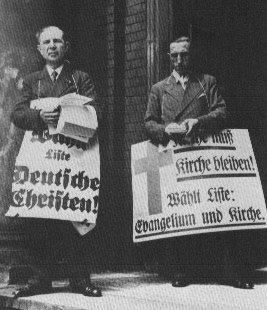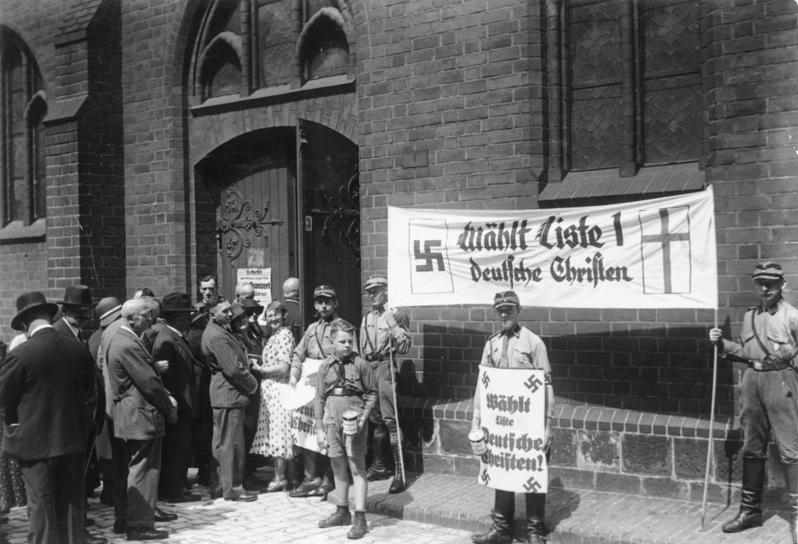|
A. C. Headlam
Arthur Cayley Headlam (2 August 1862 – 17 January 1947) was an English theologian who served as Bishop of Gloucester from 1923 to 1945. Biography Headlam was born in Whorlton, County Durham, the son of its vicar, Arthur William Headlam (1826–1908), by his first wife, Agnes Favell. The historian James Wycliffe Headlam was his younger brother. He was educated at Winchester College and New College, Oxford, where he read Greats. He was a Fellow of All Souls College, Oxford, from 1885. He was ordained in 1888, and became Rector of Welwyn in 1896. In 1900 Headlam married Evelyn Persis Wingfield. He was Professor of Dogmatic Theology at King's College London from 1903–1916, where he served as Principal from 1903 to 1912 and as the first Dean from 1908 until 1913. He was Regius Professor of Divinity, Oxford from 1918 to 1923. His 1920 Bampton Lectures showed the theme of ecumenism that would preoccupy him. At the time of the 1926 General Strike, he opposed the intervention of ... [...More Info...] [...Related Items...] OR: [Wikipedia] [Google] [Baidu] |
Order Of The Companions Of Honour
The Order of the Companions of Honour is an order of the Commonwealth realms. It was founded on 4 June 1917 by King George V as a reward for outstanding achievements. Founded on the same date as the Order of the British Empire, it is sometimes regarded as the junior order to the Order of Merit. The order was originally intended to be conferred upon a limited number of persons for whom this special distinction seemed to be the most appropriate form of recognition, constituting an honour disassociated either from the acceptance of title or the classification of merit. It is now described as being "awarded for having a major contribution to the arts, science, medicine, or government lasting over a long period of time". The first recipients of the order were all decorated for "services in connection with the war" and were listed in ''The London Gazette''. Composition The order consists of the monarch of the Commonwealth realms, who is the Sovereign of the Order of the Companions ... [...More Info...] [...Related Items...] OR: [Wikipedia] [Google] [Baidu] |
Appeaser
Appeasement in an international context is a diplomatic policy of making political, material, or territorial concessions to an aggressive power in order to avoid conflict. The term is most often applied to the foreign policy of the UK governments of Prime Ministers Ramsay MacDonald (in office: 1929–1935), Stanley Baldwin (in office: 1935–1937) and (most notably) Neville Chamberlain (in office: 1937–1940) towards Nazi Germany (from 1933) and Fascist Italy (established in 1922) between 1935 and 1939. Under British pressure, appeasement of Nazism and Fascism also played a role in French foreign policy of the period, but was always much less popular than in the United Kingdom. At the beginning of the 1930s, appeasing concessions were widely seen as desirable—due to the anti-war reaction to the trauma of World War I (1914–1918), second thoughts about the perceived vindictive treatment by some of Germany in the 1919 Treaty of Versailles, and a perception that fascism was a ... [...More Info...] [...Related Items...] OR: [Wikipedia] [Google] [Baidu] |
Confessing Church
The Confessing Church (german: link=no, Bekennende Kirche, ) was a movement within German Protestantism during Nazi Germany that arose in opposition to government-sponsored efforts to unify all Protestant churches into a single pro-Nazi German Evangelical Church. See drop-down essay on "Unification, World Wars, and Nazism" Demographics The following statistics (as of January 1933 unless otherwise stated) are an aid in understanding the context of the political and theological developments discussed in this article. *Number of Protestants in Germany: 45 million *Number of free church Protestants: 150,000 *Largest regional Protestant church: Evangelical Church of the Old Prussian Union (german: link=no, Evangelische Kirche der altpreußischen Union), with 18 million members, the church strongest in members in the country at the time. *Number of Protestant pastors: 18,000 **Number of these strongly adhering to the "German Christian" church faction as of 1935: 3000 **Number of the ... [...More Info...] [...Related Items...] OR: [Wikipedia] [Google] [Baidu] |
Germany
Germany,, officially the Federal Republic of Germany, is a country in Central Europe. It is the second most populous country in Europe after Russia, and the most populous member state of the European Union. Germany is situated between the Baltic and North seas to the north, and the Alps to the south; it covers an area of , with a population of almost 84 million within its 16 constituent states. Germany borders Denmark to the north, Poland and the Czech Republic to the east, Austria and Switzerland to the south, and France, Luxembourg, Belgium, and the Netherlands to the west. The nation's capital and most populous city is Berlin and its financial centre is Frankfurt; the largest urban area is the Ruhr. Various Germanic tribes have inhabited the northern parts of modern Germany since classical antiquity. A region named Germania was documented before AD 100. In 962, the Kingdom of Germany formed the bulk of the Holy Roman Empire. During the 16th ce ... [...More Info...] [...Related Items...] OR: [Wikipedia] [Google] [Baidu] |
Protestant Reich Church
The German Evangelical Church (german: Deutsche Evangelische Kirche) was a successor to the German Evangelical Church Confederation from 1933 until 1945. The German Christians, an antisemitic and racist pressure group and ''Kirchenpartei'', gained enough power on boards of the member churches to be able to install Ludwig Müller to the office of ' in the 1933 church elections. The German Evangelical Church Confederation was subsequently renamed the German Evangelical Church. In 1934, the German Evangelical Church suffered controversies and internal struggles which left member churches either detached or reorganised into German Christians-led dioceses of what was to become a single, unified Reich Church compatible with Nazi ideology for all of Nazi Germany. In 1935, in wake of controversies and church struggles, the Ministry for Church Affairs removed Ludwig Müller and installed a committee headed by Wilhelm Zoellner to lead the confederation. As a result, the German Evangelica ... [...More Info...] [...Related Items...] OR: [Wikipedia] [Google] [Baidu] |
1926 United Kingdom General Strike
The 1926 general strike in the United Kingdom was a general strike that lasted nine days, from 4 to 12 May 1926. It was called by the General Council of the Trades Union Congress (TUC) in an unsuccessful attempt to force the British government to act to prevent wage reductions and worsening conditions for 1.2 million locked-out coal miners. Some 1.7 million workers went out, especially in transport and heavy industry. The government was well prepared, and enlisted middle class volunteers to maintain essential services. There was little violence and the TUC gave up in defeat. Causes From 1914 to 1918, the United Kingdom participated in World War I. Heavy domestic use of coal during the war depleted once-rich seams. Britain exported less coal during the war than it would have in peacetime, allowing other countries to fill the gap. This particularly benefited the strong coal industries of the United States, Poland, and Germany. In the early 1880s, coal production was ... [...More Info...] [...Related Items...] OR: [Wikipedia] [Google] [Baidu] |
Ecumenism
Ecumenism (), also spelled oecumenism, is the concept and principle that Christians who belong to different Christian denominations should work together to develop closer relationships among their churches and promote Christian unity. The adjective ''ecumenical'' is thus applied to any initiative that encourages greater cooperation and union among Christian denominations and churches. The fact that all Christians belonging to mainstream Christian denominations profess faith in Jesus as Lord and Saviour over a believer's life, believe that the Bible is the infallible, inerrant and inspired word of God (John 1:1), and receive baptism according to the Trinitarian formula is seen as being a basis for ecumenism and its goal of Christian unity. Ecumenists cite John 17:20-23 as the biblical grounds of striving for church unity, in which Jesus prays that Christians "may all be one" in order "that the world may know" and believe the Gospel message. In 1920, the Ecumenical Patriarch ... [...More Info...] [...Related Items...] OR: [Wikipedia] [Google] [Baidu] |
Bampton Lectures
The Bampton Lectures at the University of Oxford, England, were founded by a bequest of John Bampton. They have taken place since 1780. They were a series of annual lectures; since the turn of the 20th century they have typically been biennial. They continue to concentrate on Christian theological topics. The lectures have traditionally been published in book form. On a number of occasions, notably at points during the 19th century, they attracted great interest and controversy. Lecturers (incomplete list) 1780–1799 * 1780 – James Bandinel ''Eight Sermons preached before the University of Oxford'' * 1781 – Timothy Neve ''Eight Sermons preached before the University of Oxford'' * 1782 – Robert Holmes ''The Prophecies and Testimony of John the Baptist, and the parallel Prophecies of Jesus Christ'' * 1783 – John Cobbbr>''Eight sermons preached before the University of Oxford''* 1784 – Joseph White ''Mahometism and Christianity'' * 1785 – Ralph Churton ''On the P ... [...More Info...] [...Related Items...] OR: [Wikipedia] [Google] [Baidu] |
Principal (university)
The principal is the chief executive and the chief academic officer of a university or college in certain parts of the Commonwealth. In the United States, the principal is the head of school at most pre-university, non-boarding schools. Canada Queen's University, the constituent colleges of the University of Toronto and McGill University in Canada have principals instead of presidents or rectors, as a result of their Scottish origins. In addition Bishop's University, and the Royal Military College of Canada also have principals. England Many colleges of further education in England have a principal in charge (e.g., Cirencester College and West Nottinghamshire College). At Oxford University, many of the heads of colleges are known as the principal, including Brasenose, Green Templeton, Harris Manchester, Hertford, Jesus, Lady Margaret Hall, Linacre, Mansfield, St Anne's, St Edmund Hall, St Hilda's, St Hugh's, and Somerville. At Cambridge University, heads ... [...More Info...] [...Related Items...] OR: [Wikipedia] [Google] [Baidu] |
King's College London
King's College London (informally King's or KCL) is a public research university located in London, England. King's was established by royal charter in 1829 under the patronage of King George IV and the Duke of Wellington. In 1836, King's became one of the two founding colleges of the University of London. It is one of the oldest university-level institutions in England. In the late 20th century, King's grew through a series of mergers, including with Queen Elizabeth College and Chelsea College of Science and Technology (in 1985), the Institute of Psychiatry (in 1997), the United Medical and Dental Schools of Guy's and St Thomas' Hospitals and the Florence Nightingale School of Nursing and Midwifery (in 1998). King's has five campuses: its historic Strand Campus in central London, three other Thames-side campuses (Guy's, St Thomas' and Waterloo) nearby and one in Denmark Hill in south London. It also has a presence in Shrivenham, Oxfordshire, for its professional mi ... [...More Info...] [...Related Items...] OR: [Wikipedia] [Google] [Baidu] |






